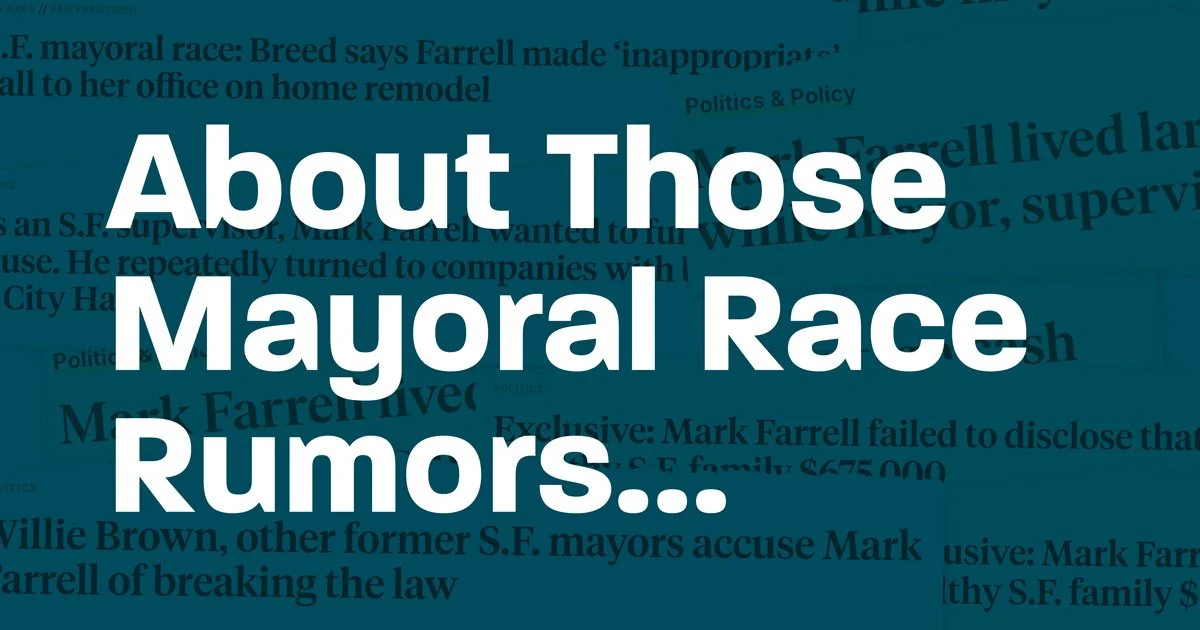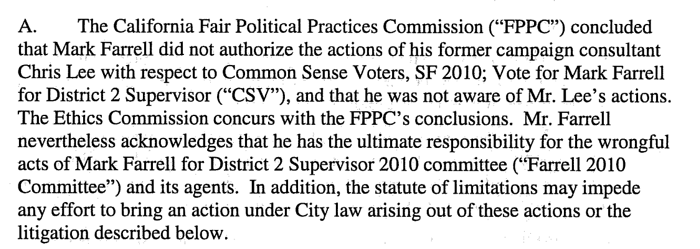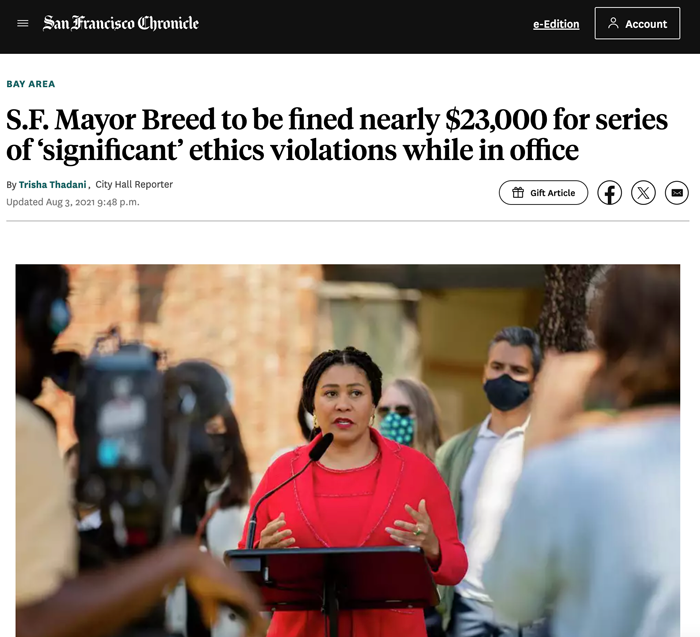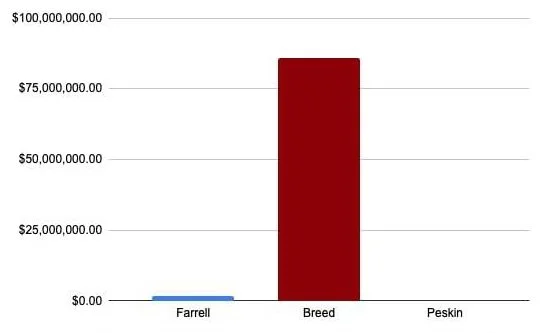About Those Mayoral Race Rumors…
It is famously said that San Francisco politics is like a knife fight in a phone booth. With less than a month until Election Day, rumors are flying. Mark Farrell (our top pick for mayor), current Mayor London Breed, and Levi Strauss heir Daniel Lurie are all vying for similar voters’ hearts.
Since their policies are all quite similar, you’d think the conversation would be focused on which one can actually deliver. For us, that person is Mark Farrell, the only candidate with a proven track record in both the private and public sector.
But this is San Francisco politics, so campaign mailers and the press aren’t talking about efficacy. Instead, they’re hurling insults and playing dirty politics, forcing everyone else to follow suit or die. One of Mark Farrell’s opponents is the incumbent facing the fact that 59 percent of voters say their city is on the wrong track; the other is using more than $7 million of his own money to run a campaign that spends a significant amount against Mark. Thanks to his inherited wealth, Lurie’s campaign budget is bigger than all the other candidates’ combined and is breaking spending records in San Francisco politics.
Here’s what happens after a well-funded candidate digs up opposition research. Their campaign pitches a story that is unsubstantiated but "raises questions." The press covers it, not necessarily because it's deeply investigated, but because political gossip drives clicks and attention. Publications need the traffic, so they run the story based on a source, slap a quote on it, and move on. The story blows up, and voters think there's something there because it came from the media, a source they trust.
This is not how we’d like the world to be, but here we are. And because this is where we are, we must address some of the swirling rumors, because they matter to voters—and rightfully so. Voters want to vote for a trustworthy and transparent mayor.
Should voters worry about Mark Farrell’s home loan filing error?
Answer: No. San Francisco candidates all have to file FPPC Form 700s, also known as Statements of Economic Interest. This is to ensure that public officials aren’t using their positions to enrich their personal finances or engaging in conflicts of interest. Mark Farrell did make a filling error on his Form 700 and corrected it as soon as he was made aware of it. But the financial information he failed to disclose does not reveal a conflict of interest, nor does it impact his ability to serve as mayor in any capacity.
The forgotten disclosure: Mark Farrell borrowed $675,000 from the individual selling the home to finance the purchase—a very normal arrangement. The individual who made the loan has no interest or business in front of the city so there is no potential for a conflict.
Look, mistakes happen. If you want your next mayor to never make filing errors, you can let this knock against Mark influence your decision. We’d rather focus on his ability to manage our city’s department heads, balance the budget, and respond to residents’ concerns. Interestingly enough, Mark is facing an opponent in Daniel Lurie with seemingly unlimited resources to spend on his campaign, but very little experience. Perhaps that giant campaign budget is buying opposition researchers to dig up dirt and plant stories to distract from Lurie’s lack of experience?
Did Mark Farrell call London Breed asking to expedite the permits for his home?
Answer: No one actually knows. But Breed’s claim doesn’t add up. Current Mayor London Breed called the San Francisco Standard to start a rumor that in a phone call—the date and time of which has conveniently slipped her mind—Mark Farrell pressured her into expediting a permit for the construction he wanted to do on his home. She doubled down that the call happened sometime in 2019 but Mark purchased his home in 2020, so this does not add up.
It’s reported that Mark called a former colleague in the Mayor’s office to ask about permitting timelines in April 2020, right after the COVID pandemic hit and the world shut down. San Francisco has a lengthy permitting process and trying to understand the impacts of global pandemic on an already convoluted process is understandable. Mark was explicit that he was asking about timelines, not asking for favors.
Bottom line: Mayor Breed insists a call happened prior to Mark Farrell even owning the home and that he was looking for favors. But there is no evidence to back this up. And the fact that Mayor Breed is getting her timeline mixed up further casts doubt on her version of events. It’s well-known that these two don’t get along and Farrell is Breed’s competitor. Do you really think Mark called London for a favor? Treat this story with the skepticism it deserves.
Was Mark Farrell fined by the Ethics Commission for violating campaign finance laws?
Answer: Yes, but he was personally exonerated by the state. Here’s how campaign financing works: Every candidate for office has their campaign, whose funds are subject to campaign finance limits, and some benefit from an “independent expenditure,” or IE. An IE is a group or entity that is raising money in support of a candidate, but not coordinating with them directly—like the group Forward Action, which is supporting Mayor Breed.
In case that wasn’t complicated enough, there are also very complex laws surrounding what is and is not considered “coordination.” It is well-known by SF politicos that an easy way to generate headlines against your opponent is to exploit this system by looking for slip-ups and filing ethics complaints against them. In 2015, a campaign consultant working for Mark Farrell was accused of illegally coordinating with an IE by one of his opponents. Headlines and a legal battle ensued.
In the end, the FPPC found that Farrell didn’t authorize his consultant to coordinate with the IE, and despite what it says on Lurie’s attack mailers, as legal fees were mounting, Farrell ultimately paid $25,000 to settle—not $191,000. His consultant was also fined separately.
This might sound bad, but it happens frequently—like when Breed had to pay $22,792 to settle similar campaign finance allegations.
Did Mark Farrell use the power of his office to fund his “pet projects”?
Answer: Yes, Mark Farrell raised private money to open schoolyards that were closed due to budget cuts. Politicians used to be able to legally “behest” payments from companies or individuals to a specific cause. This changed in 2022, but until then was kosher. Even with the changes made to behested payment laws, a majority of Farrell’s behested payments would still be permitted today. Between 2011 to 2018, Farrell directed more than $1.2 million to the Parks Alliance by asking corporations and individuals to donate to the nonprofit. A majority of these payments were used to keep schoolyards open on the weekends, and Mark also used these payments to fund the creation of WiFi infrastructure across the city. If expanding access to playgrounds and WiFi using legal means makes you suspicious, you’ve been reading too much Reddit.
Now if you’re titillated by Mark’s behested payments, wait ‘til you see Breed’s.
Mayor Breed has used behested payments to direct $85 million to various causes since she was elected mayor—even without the $34 million used to support the city during COVID-19, that is still a considerable sum. And Breed’s behested payments reveal deeper connections to some of the city’s most corrupt individuals.
Victor Makras and Dwayne Jones, both of whom were arrested on charges relating to public corruption investigations, gave thousands to the 2018 and 2020 mayoral inaugural funds at Breed’s behest. At Breed’s behest, over $1 million was paid to the now-infamous Collective Impact, a city nonprofit contractor under investigation for misusing public money and insider dealing. And that’s just a few of the receipts.
Is Mark Farrell illegally commingling funds with his committee to support Prop D?
Answer: No. Let us illuminate the depressing reason for your long-ass ballot: candidates using public financing can only accept campaign contributions in the amount of $500 or less from each individual, while committees to support ballot measures can accept unlimited contributions. Candidates support ballot measures so they can raise money into them, and use the ballot measures to promote their agendas.
That’s why Peskin, Safaí, and Breed all have at least one measure on the ballot this year. Lurie doesn’t, because of his aforementioned family wealth. But in the March primary election, Lurie did open a committee in support of Breed's Proposition E because he wanted to associate himself with improving public safety.
Mark supports Proposition D, the ballot measure TogetherSF Action is sponsoring (so does Lurie). He uses the money to produce mailers, run mobilizations, and convince voters to support Prop D. Some of those efforts to support Prop D feature Mark’s endorsement of Prop D, and this is normal practice for most, if not all, candidates. Every expense that is shared between his campaign and the Prop D campaign is publicly available. This is also normal.
You may have seen in the news that three former SF mayors have called for a criminal investigation into this, even though they of all people know it’s not worthy of that. Upon closer inspection, these former mayors may have retired, but the habits political insiders learn die hard: Agnos supports Peskin, Brown supports Breed, and Jordan supports Lurie. The Standard reported that the letter was written by prominent criminal defense attorney John Keker, who is backing Lurie and was also the defense attorney for Mohammed Nuru, who was convicted of public corruption charges.
That’s politics, baby. These manufactured controversies are designed to confuse voters, but the truth is far less exciting. Let’s focus on what really matters: the candidates' ability to lead and address the city’s challenges.
Paid for by TogetherSF Action (tsfaction.org). Financial disclosures are available at sfethics.org.




